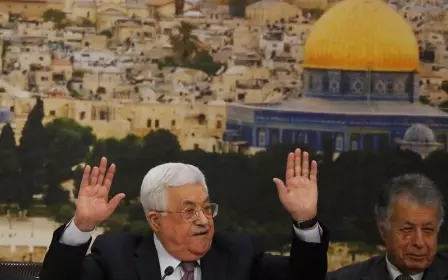Qaradawi's jailed daughter goes on hunger strike in Egypt
The daughter of Qatar-based Egyptian imam Yousef al-Qaradawi has gone on hunger strike after almost a year in solitary confinement in Egypt, her lawyers and family said.
The 56-year-old Ola al-Qaradawi and her husband, Hosam Khalaf, were arrested on 30 June 2017. While their detention has been periodically renewed, they have not been presented with formal charges or a trial date, according to their attorneys.
Qaradawi told her lawyer in Cairo on Tuesday that she is "done with one year of solitary confinement," her daughter Aayah Hosam said.
"She said, I'm done with this, and I can't take this anymore, so I'm going on a hunger strike from today to demand my freedom," Hosam told Middle East Eye.
Hosam suspects that the couple's detention is related to a regional feud between Egypt and Qatar.
Egypt joined Saudi Arabia, the UAE and Bahrain in cutting trade and diplomatic relations with Qatar less than a month before Qaradawi's arrest.
The Saudi-led bloc blacklisted imam Qaradawi, who had become emblematic of Qatar's alleged links to the Muslim Brotherhood. The influential scholar hosted a TV show on the Doha-based Al Jazeera network.
Egypt must now resolve these cases and reunite them with their loved ones. They must be released immediately and unconditionally.
- Jared Genser, lawyer
The preacher expressed enthusiastic support for the Arab Spring uprisings in 2011 and condemned the 2013 military coup against Mohamed Morsi, who was Egypt's first democratically elected president and belonged to the Muslim Brotherhood.
Although he is often identified as the chairman of the Muslim Brotherhood, Qaradawi holds no official position in the group.
Both Ola and her husband are legal US permanent residents and have many family members who are US citizens.
International condemnation
Rights groups and US politicians have denounced Egypt's treatment of Qaradawi and Khalaf.
Last week, a UN human rights panel found Qaradawi and Khalaf's detention to be in violation of international law.
The Working Group on Arbitrary Detention, which is overseen by the UN Human Rights Council, urged Egyptian authorities to release and compensate the couple.
Jared Genser, the family's lawyer in the US, said the UN report vindicates the argument that Qaradawi and her husband are innocent victims.
"Egypt must now resolve these cases and reunite them with their loved ones," Genser said in a statement. "They must be released immediately and unconditionally."
Hosam, a US citizen who lives near Seattle in the northwestern state of Washington, called on the US government to intervene and secure her parents' release.
She has been lobbying government officials to speak out about the situation.
Hosam said she is optimistic about international solidarity producing a positive outcome.
"But we're hoping for more, especially from the US government, we're hoping for more pressure from here," she said. "We think that's the only way to get anything done."
Hosam added that Washington particularly has leverage to address her parent's ordeal because of the annual $1.5bn US aid to Egypt.
Qaradawi had informed her lawyer of the hunger strike after a court appearance in Cairo, where she had a rare chance to speak to him for a few minutes, according to Hosam.
The lawyer had cautioned her against the protest because of her deteriorating health, Hosam said.
"She's in very poor health, already lost a lot of weight," Hosam told MEE in a phone interview. "We don't know exactly what's going on, but the lawyer knows from how she looks that she's not in a very healthy situation."
She added that the family will not know how the hunger strike will impact her mother because they have no way of contacting Qaradawi or seeing her until the next court hearing in 45 days to renew her detention.
"There's no legal process," Hosam said. "The lawyer doesn't even get to speak in court. They just do this hocus pocus hearing kind of thing. My mother doesn't talk. They just renew the detention as a [routine] thing, and that's it - no charges or evidence being put forward, nothing."
Middle East Eye propose une couverture et une analyse indépendantes et incomparables du Moyen-Orient, de l’Afrique du Nord et d’autres régions du monde. Pour en savoir plus sur la reprise de ce contenu et les frais qui s’appliquent, veuillez remplir ce formulaire [en anglais]. Pour en savoir plus sur MEE, cliquez ici [en anglais].




